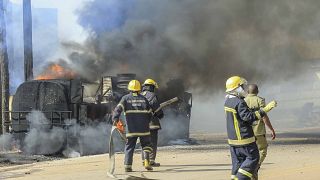Nigeria
Lagos residents on Wednesday said economic hardship and hunger were linked to the deaths of people who were scooping up fuel from an overturned gasoline tanker when it exploded.
More than 140 people, including children, were killed and dozens were injured in Nigeria after an overturned gasoline tanker truck exploded in flames while they were trying to scoop up fuel pouring from the vehicle, emergency services said Wednesday.
The accident occurred at midnight in Jigawa state's Majiya town when the tanker driver lost control of the vehicle while traveling on a highway, a police spokesperson said. Residents rushed to the scene and were scooping up fuel, “sparking a massive inferno,” he said.
“I blame both we the people, I also blame government because if the government is doing the right thing to ensure that the welfare of citizens are priority to them, all this will not happen”, said civil servant Emenike Okpaga in Lagos.
"No one in their right senses would go around scooping fuel but for hunger," added software engineer Emmanuel Isaac.
"When that person sees an opportunity to make money from scooping fuel, they will take that chance," he explained.
"I think we need to do better as a community, we need to do better as a nation, people cannot just continue to live a life of hunger."
Residents of Majiya were in mourning on Wednesday as they held a mass burial for the victims. Most of the bodies were unrecognizable, emergency services said.
Deadly tanker accidents are common in Nigeria, Africa’s most populous country, where traffic regulations are not strictly enforced in many places and there is a lack of an efficient railway system to transport cargo.
It is also common for people to salvage fuel with cups and buckets to take home after such accidents. The practice has become more common because of soaring fuel prices, which have tripled since the start of last year as the government ended costly gas subsidies.












Go to video
Funeral held in Kenya for TikTok content moderator
Go to video
After 53-hour search, families await answers in Dominican nightclub collapse
01:09
Yinka Shonibare explores identity and hybridity in new Madagascar exhibition
Go to video
Lassa fever kills 118 in Nigeria since the start of the year
Go to video
Pics of the day: March 31, 2025
01:06
Ghana: Nigerian boxer Gabriel Olanrewagu collapses in ring at Bukom arena